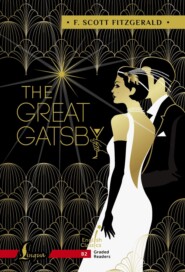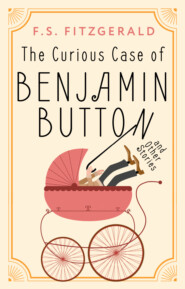По всем вопросам обращайтесь на: info@litportal.ru
(©) 2003-2025.
✖
Загадочная история Бенджамина Баттона / The Curious Case of Benjamin Button
Год написания книги
2020
Теги
Настройки чтения
Размер шрифта
Высота строк
Поля
He went to his father. “I am grown,” he announced. “I want to put on long trousers.”
His father hesitated. “Well,” he said finally, “I don’t know. Fourteen is the age for putting on long trousers—and you are only twelve.” “But I’m big for my age.”
“Oh, I’m not so sure of that,” he said. “I was as big as you when I was twelve.”
This was not true—it was all part of Roger Button’s silent agreement with himself to believe in his son’s normality.
Finally a compromise was reached. Benjamin was to continue to dye his hair[8 - Benjamin was to continue to dye his hair.—Бенджамин должен был продолжать красить свои волосы.]. He was to make a better attempt to play with boys of his own age. He was not to wear his spectacles or carry a cane in the street. In return he was allowed his first suit of long trousers.
Of Benjamin Button’s life between his twelfth and twenty-first year I intend to say little. They were years of normal ungrowth. When Benjamin was eighteen he reminded of a man of fifty; he had more hair and it was of a dark gray; his step was firm, his voice had lost its cracked quaver and turned into a healthy baritone. So his father sent him up to Connecticut to take examinations for entrance to Yale College. Benjamin passed his examination and became a member of the freshman class.
On the third day after his matriculation he received a notification from Mr. Hart, the college registrar, to call at his office and arrange his schedule. Benjamin, glancing in the mirror, decided that his hair needed a new application of its brown dye, but suddenly he saw that the dye bottle was not there. Then he remembered he had emptied it the day before and thrown it away. He was due at the registrar’s in five minutes. There seemed to be no help for it. He must go as he was. He did.
“Good-morning,” said the registrar politely. “You’ve come to inquire about your son.”
“Why, as a matter of fact, my name’s Button—” began Benjamin, but Mr. Hart cut him off.
“I’m very glad to meet you, Mr. Button. I’m expecting your son here any minute.”
“That’s me!” burst out Benjamin. “I’m a freshman.”
“What!”
“I’m a freshman.”
“Surely you’re joking.”
“Not at all.”
The registrar frowned and glanced at a card before him.
“Why, I have Mr. Benjamin Button’s age down here as eighteen.” “That’s my age,” asserted Benjamin, flushing slightly[9 - flushing slightly—слегка краснея].
The registrar eyed him wearily. “Now surely, Mr. Button, you don’t expect me to believe that.[10 - Now surely, Mr. Button, you don’t expect me to believe that.—Мистер Баттон, Вы, конечно, не ожидаете, что я поверю в это.]”
Benjamin smiled wearily. “I am eighteen,” he repeated.
The registrar pointed to the door. “Get out,” he said. “Get out of college and get out of town. You are a dangerous lunatic.”
“I am eighteen.”
Mr. Hart opened the door. “The idea!” he shouted. “A man of your age trying to enter here as a freshman. Eighteen years old, are you? Well, I’ll give you eighteen minutes to get out of town.”
Benjamin Button walked with dignity from the room, and the under – graduates, who were waiting in the hall, followed him curiously with their eyes. Benjamin turned around, faced the registrar, who was still standing in the doorway, and repeated in a firm voice: “I am eighteen years old.”
To a chorus of the undergraduates’ laughter Benjamin walked away.
But he was not fated to escape so easily. On his sad walk to the railroad station he found that he was being followed by a group, then by a swarm, and finally by a dense mass of undergraduates. The word had gone around that a lunatic had passed the entrance examinations and claimed he was eighteen. Men ran hatless out of classes, the football team abandoned its practice and joined the mob, professors’ wives ran shouting after the procession that made hundreds of remarks about Benjamin Button.
“Look at the infant prodigy!”
“He thought this was the home for the aged.”
“Go up to Harvard!”
Benjamin was soon running. He would show them! He would go to Harvard, and then they would regret their words!
Safely on board the train for Baltimore, he put his head from the window. “You’ll regret this!” he shouted.
“Ha-ha!” the undergraduates laughed. “Ha-ha-ha!” It was the biggest mistake that Yale College had ever made.
In 1880 Benjamin Button was twenty years old, and he went to work for his father in Roger Button & Co., Wholesale Hardware. It was in that same year that he began “going out socially”—that is, his father insisted on taking him to several dances. Roger Button was now fifty. Since Benjamin had ceased to dye his hair (which was still grayish) he and his father seemed to be about the same age, and looked like brothers.
One night in August they got into the carriage in their suits and drove out to a dance at the Shevlins’ country house. It was a gorgeous evening. It was almost impossible not to be affected by the beauty of the sky—almost.
“There’s a great future in our business,” Roger Button was saying. He was not a romantic man—his aesthetic sense was rudimentary.
“But old fellows like me can’t learn new tricks,” he continued. “It’s you youngsters with energy and vitality that have the great future before you.”
They pulled up behind a handsome carriage whose passengers were disembarking at the door. A lady got out, then an elderly gentleman, then another beautiful young lady.
Blood rose into Benjamin’s cheeks and there was a steady thumping in his ears. It was first love. The girl was slender and frail[11 - the girl was slender and frail—девочка была стройная и хрупкая], with hair that was ashen under the moon and honey-coloured under the gas lamps of the porch.
Roger Button leaned over to his son. “That,” he said, “is young Hildegarde Moncrief, the daughter of General Moncrief.”
Benjamin nodded coldly. “Dad, you might introduce me to her.”
They approached a group, of which Miss Moncrief was the centre. She curtsied low before Benjamin. Yes, he might have a dance. He thanked her and walked away.
The interval until the time for his turn seemed interminable. He stood close to the wall silent, watching with murderous eyes the young men of Baltimore as they surrounded Hildegarde Moncrief. Their curling brown whiskers made him feel sick.
But when his own time came and he drifted with her to the music of the latest waltz from Paris, his jealousies and anxieties melted like snow. He felt that life was just beginning.
“You and your brother got here just as we did, didn’t you?” asked
Hildegarde, looking up at him with her bright blue eyes.
Benjamin hesitated. If she took him for his father’s brother, would it be best to tell her the truth? He remembered his experience at Yale, so he decided against it. It would be rude to contradict a lady. Later, perhaps. So he nodded, smiled, listened, was happy.
“I like men of your age,” Hildegarde told him. “Young boys are so idiotic. They tell me how much champagne they drink at college, and how much money they lose playing cards. Men of your age know how to appreciate women.”
Benjamin was about to propose to her, with an effort he choked back the impulse.
“You’re just the romantic age,” she continued—”fifty. Thirty is pale from overwork; forty is the age of long stories that take a whole cigar to tell; sixty is—oh, sixty is too near seventy; but fifty is the best age. I love fifty.”
Fifty seemed to Benjamin a glorious age. He suddenly wanted to be fifty.
“I’ve always said,” went on Hildegarde, “that I’d rather marry a man of fifty and be taken care of than many a man of thirty and take care of him.”
His father hesitated. “Well,” he said finally, “I don’t know. Fourteen is the age for putting on long trousers—and you are only twelve.” “But I’m big for my age.”
“Oh, I’m not so sure of that,” he said. “I was as big as you when I was twelve.”
This was not true—it was all part of Roger Button’s silent agreement with himself to believe in his son’s normality.
Finally a compromise was reached. Benjamin was to continue to dye his hair[8 - Benjamin was to continue to dye his hair.—Бенджамин должен был продолжать красить свои волосы.]. He was to make a better attempt to play with boys of his own age. He was not to wear his spectacles or carry a cane in the street. In return he was allowed his first suit of long trousers.
Of Benjamin Button’s life between his twelfth and twenty-first year I intend to say little. They were years of normal ungrowth. When Benjamin was eighteen he reminded of a man of fifty; he had more hair and it was of a dark gray; his step was firm, his voice had lost its cracked quaver and turned into a healthy baritone. So his father sent him up to Connecticut to take examinations for entrance to Yale College. Benjamin passed his examination and became a member of the freshman class.
On the third day after his matriculation he received a notification from Mr. Hart, the college registrar, to call at his office and arrange his schedule. Benjamin, glancing in the mirror, decided that his hair needed a new application of its brown dye, but suddenly he saw that the dye bottle was not there. Then he remembered he had emptied it the day before and thrown it away. He was due at the registrar’s in five minutes. There seemed to be no help for it. He must go as he was. He did.
“Good-morning,” said the registrar politely. “You’ve come to inquire about your son.”
“Why, as a matter of fact, my name’s Button—” began Benjamin, but Mr. Hart cut him off.
“I’m very glad to meet you, Mr. Button. I’m expecting your son here any minute.”
“That’s me!” burst out Benjamin. “I’m a freshman.”
“What!”
“I’m a freshman.”
“Surely you’re joking.”
“Not at all.”
The registrar frowned and glanced at a card before him.
“Why, I have Mr. Benjamin Button’s age down here as eighteen.” “That’s my age,” asserted Benjamin, flushing slightly[9 - flushing slightly—слегка краснея].
The registrar eyed him wearily. “Now surely, Mr. Button, you don’t expect me to believe that.[10 - Now surely, Mr. Button, you don’t expect me to believe that.—Мистер Баттон, Вы, конечно, не ожидаете, что я поверю в это.]”
Benjamin smiled wearily. “I am eighteen,” he repeated.
The registrar pointed to the door. “Get out,” he said. “Get out of college and get out of town. You are a dangerous lunatic.”
“I am eighteen.”
Mr. Hart opened the door. “The idea!” he shouted. “A man of your age trying to enter here as a freshman. Eighteen years old, are you? Well, I’ll give you eighteen minutes to get out of town.”
Benjamin Button walked with dignity from the room, and the under – graduates, who were waiting in the hall, followed him curiously with their eyes. Benjamin turned around, faced the registrar, who was still standing in the doorway, and repeated in a firm voice: “I am eighteen years old.”
To a chorus of the undergraduates’ laughter Benjamin walked away.
But he was not fated to escape so easily. On his sad walk to the railroad station he found that he was being followed by a group, then by a swarm, and finally by a dense mass of undergraduates. The word had gone around that a lunatic had passed the entrance examinations and claimed he was eighteen. Men ran hatless out of classes, the football team abandoned its practice and joined the mob, professors’ wives ran shouting after the procession that made hundreds of remarks about Benjamin Button.
“Look at the infant prodigy!”
“He thought this was the home for the aged.”
“Go up to Harvard!”
Benjamin was soon running. He would show them! He would go to Harvard, and then they would regret their words!
Safely on board the train for Baltimore, he put his head from the window. “You’ll regret this!” he shouted.
“Ha-ha!” the undergraduates laughed. “Ha-ha-ha!” It was the biggest mistake that Yale College had ever made.
In 1880 Benjamin Button was twenty years old, and he went to work for his father in Roger Button & Co., Wholesale Hardware. It was in that same year that he began “going out socially”—that is, his father insisted on taking him to several dances. Roger Button was now fifty. Since Benjamin had ceased to dye his hair (which was still grayish) he and his father seemed to be about the same age, and looked like brothers.
One night in August they got into the carriage in their suits and drove out to a dance at the Shevlins’ country house. It was a gorgeous evening. It was almost impossible not to be affected by the beauty of the sky—almost.
“There’s a great future in our business,” Roger Button was saying. He was not a romantic man—his aesthetic sense was rudimentary.
“But old fellows like me can’t learn new tricks,” he continued. “It’s you youngsters with energy and vitality that have the great future before you.”
They pulled up behind a handsome carriage whose passengers were disembarking at the door. A lady got out, then an elderly gentleman, then another beautiful young lady.
Blood rose into Benjamin’s cheeks and there was a steady thumping in his ears. It was first love. The girl was slender and frail[11 - the girl was slender and frail—девочка была стройная и хрупкая], with hair that was ashen under the moon and honey-coloured under the gas lamps of the porch.
Roger Button leaned over to his son. “That,” he said, “is young Hildegarde Moncrief, the daughter of General Moncrief.”
Benjamin nodded coldly. “Dad, you might introduce me to her.”
They approached a group, of which Miss Moncrief was the centre. She curtsied low before Benjamin. Yes, he might have a dance. He thanked her and walked away.
The interval until the time for his turn seemed interminable. He stood close to the wall silent, watching with murderous eyes the young men of Baltimore as they surrounded Hildegarde Moncrief. Their curling brown whiskers made him feel sick.
But when his own time came and he drifted with her to the music of the latest waltz from Paris, his jealousies and anxieties melted like snow. He felt that life was just beginning.
“You and your brother got here just as we did, didn’t you?” asked
Hildegarde, looking up at him with her bright blue eyes.
Benjamin hesitated. If she took him for his father’s brother, would it be best to tell her the truth? He remembered his experience at Yale, so he decided against it. It would be rude to contradict a lady. Later, perhaps. So he nodded, smiled, listened, was happy.
“I like men of your age,” Hildegarde told him. “Young boys are so idiotic. They tell me how much champagne they drink at college, and how much money they lose playing cards. Men of your age know how to appreciate women.”
Benjamin was about to propose to her, with an effort he choked back the impulse.
“You’re just the romantic age,” she continued—”fifty. Thirty is pale from overwork; forty is the age of long stories that take a whole cigar to tell; sixty is—oh, sixty is too near seventy; but fifty is the best age. I love fifty.”
Fifty seemed to Benjamin a glorious age. He suddenly wanted to be fifty.
“I’ve always said,” went on Hildegarde, “that I’d rather marry a man of fifty and be taken care of than many a man of thirty and take care of him.”

















